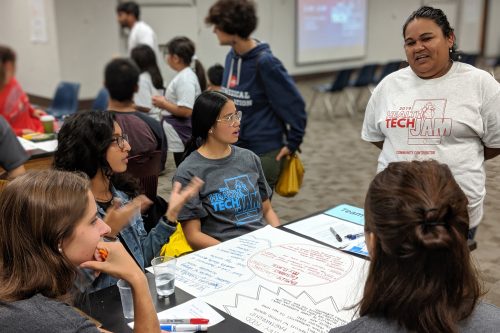A new approach to health tech

Introduction
“Remember, you will be evaluated not just on the product you pitch, but on how well you listen to the families who are participating today,” said Samantha Bond, visiting clinical assistant professor of physical therapy and biomedical information sciences, during a Saturday event at Altus Academy.
She was addressing more than 50 students from UIC’s College of Applied Health Sciences in the cafeteria of the nonprofit elementary school on Chicago’s West Side. The UIC students came together to brainstorm new health care technology ideas.
Shortly after Bond’s announcement, a group of Altus kids and their parents joined the group, where they provided feedback on the ideas — mostly for new smartphone applications — that the UIC students had been developing all morning.
The event, called the Health Tech Jam, is about helping students in the health sciences hone their ability to collaborate across disciplines and understand the role of technology in the health care system and how it can help patients.
“I participated in the Health Tech Jam because I thought it would be a great opportunity to apply the communication and design skills developed in our program to real-world problems and maybe walk away with an idea that’s worth developing into a real product,” said Leo Swanson, a 2020 master’s degree candidate in the biomedical visualization program.
This is the second time the college has hosted the event, which launched in 2018 but the first time it included a “patient” perspective, provided by Altus families.
“Feedback from the Altus families was a critical part of this event,” Bond said. “We want students to adopt a patient-centered approach to care and we want them to have experience working with members of the community.”
Solutions are only solutions, she said, if people are going to use them in everyday life.
“It was a fantastic opportunity to work with the Altus families because it was a reality check for us to understand whether or not our app would actually be catering to the needs of members of the community,” said Bendita Qian, a fourth-year undergraduate majoring in integrated health studies and minoring in life science visualization. “Not only was the feedback they gave genuine, well-intentioned and often rooted in personal experience, it also helped us check the privilege we were entering the space with.”